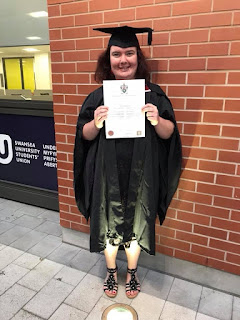- Emily Maybanks
This time last year, I finished my degree in Translation at Swansea University and thought I had my life planned out. I had a job lined up in China for fifteen months, I was finally free of deadlines and exams, and I could spend a few weeks relaxing by the sea before temporarily moving back home. A year later, my job in China didn’t work out; I’ve been in and out of temporary employment, and living with my family, thus having that independence that University and then living abroad gave me taken away. All of this has affected my mental health. As horrible, frustrating, and sometimes upsetting as this past year has been for me, I’ve learnt a lot about myself, and have some tips, advice and support for other graduates who may be experiencing similar situations and emotions, whilst feeling isolated and alone.
1. Be proud of your degree
It can be easy to feel disappointed and upset that you’ve worked hard for years to earn a degree, only to move back home, apply for job after job and attend interview after interview whilst you work out what you want to do with your life. However, getting a degree and graduating from University is certainly something to be incredibly proud of. It can open doors for you, even if those doors take a while to open! For many graduates, graduating from University is often the very first time in their life that they’re properly in the driving seat.
2. Moving back home isn’t forever
All that independence you’ve gained after studying at University and living away from home for years; learning to manage your money, time and commitments – when you move back home at the end, it can feel as though it all gets snatched away in the blink of an eye. Furthermore, your friends live all over the country or all over the world and it’s almost impossible to meet up. I have been in this situation for months and it’s had a negative effect on my mental health. Aside from becoming a dog walker and cat sitter for my parents, my confidence has rarely been lower and I miss being independent. I’ve found it useful to use this as motivation to make a better life for myself, even if it’s saving up little by little for my own place. Or, save up for a holiday for you and your friends!
3. Don’t compare yourself to anyone else
You’re scrolling through social media and seeing that other graduates have gone straight into the job of their dreams or onto other qualifications. But it’s important not to compare yourself to others – especially as what we post on social media isn’t always an accurate reflection of what’s going on or how we’re really feeling. Everyone feels insecure about what they’re doing and wondering whether they’re on the right path, which is okay and perfectly normal. Don’t compare your situation to others, live your life your own way!
4. Take your time
Graduating can mark an overwhelming period and a time of intense change. It’s okay to take a bit of time – do stuff you enjoy, volunteer for a while, relax. Take some time to figure out what it really is you want to do and then set some goals to help you begin to achieve that dream. If it means accepting employment in a different area in the meantime, then so be it. “Life is a journey, not a competition.”
“Life is funny, isn’t it? Just when you think you’ve got it all figured out, just when you finally begin to plan something, get excited about something, and feel like you know what direction you’re heading in, the paths change, the signs change, the wind blows the other way, North is suddenly South and East is West, and you’re lost.” – Cecelia Ahern.
You can find more resources on looking after your mental wellbeing here.
My name is Emily (Em). Last year, I graduated from Swansea University with my BA degree in Modern Languages, Translation & Interpreting; I was also passionate about and dedicated to Swansea Student Media and the University students’ newspaper – Waterfront. I blog for Student Minds because I have experienced mental health issues as a student and now as a graduate, as well as other health issues, and I support friends who also have mental health difficulties. I am a passionate writer and writing has been important in my mental health experiences – both in helping me to explore and to cope with my mental health, as well as sharing my story in order to help others.







